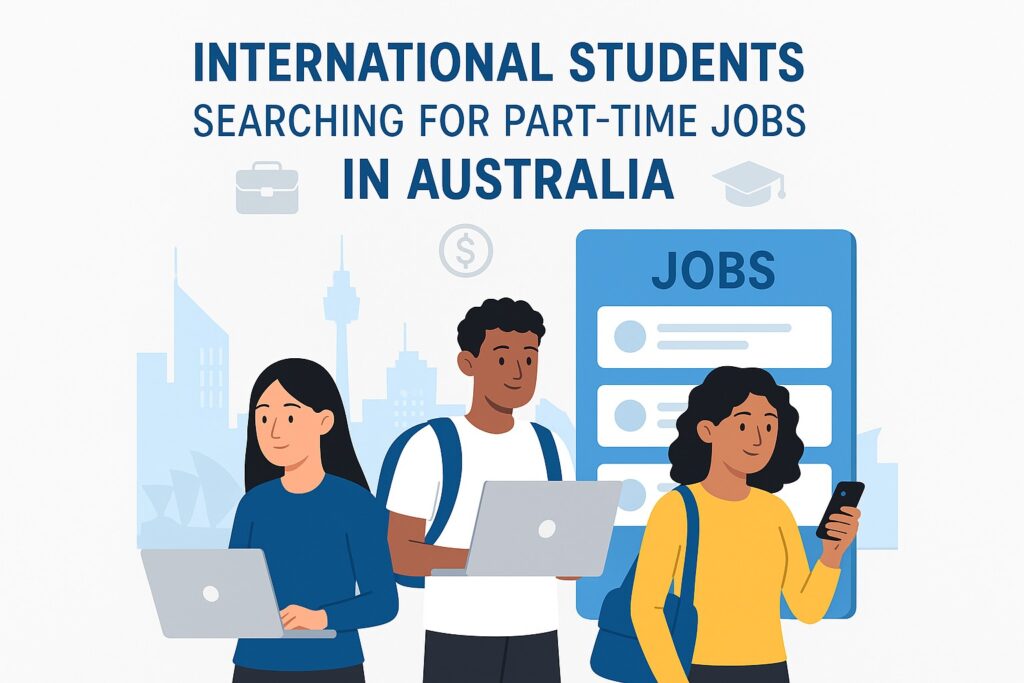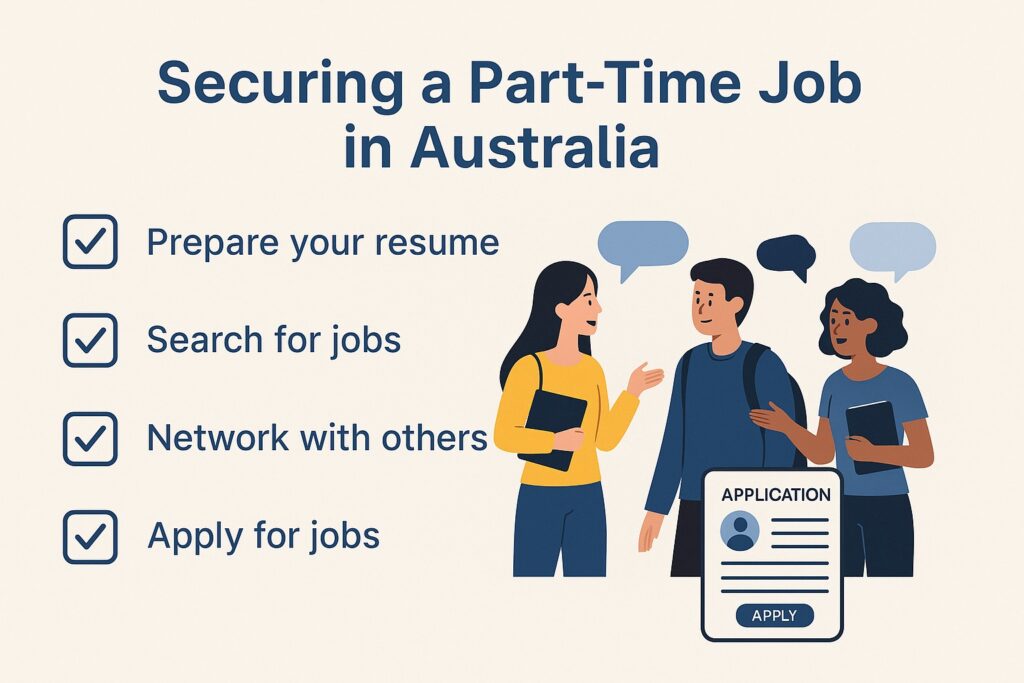Table of Contents
Introduction
Finding part time jobs in Australia is a top priority for many international students seeking to support their studies and gain valuable work experience. According to the Overseas Students Guide Australia 2023, Australia’s flexible work policies and robust job market make it one of the best countries for students who want to work while studying.
In this comprehensive guide, you’ll discover how to easily find part time jobs in Australia in 2025. We’ll cover eligibility rules, job search strategies, top industries hiring students, and practical tips for balancing work and study. Whether you’re new to Australia or planning your move, this article provides actionable insights and step-by-step advice based on the latest research and proven methods.

Background & Context
Australia is a leading destination for international students, with over 626,000 students enrolled as of March 2020. The country’s world-class education system, vibrant cities, and multicultural society attract students from across the globe. One of the most appealing aspects for students is the ability to work part time while studying.
International students in Australia are permitted to work up to 40 hours per fortnight during the semester and unlimited hours during semester breaks. This policy not only helps students cover living expenses but also provides practical experience in an English-speaking work environment. The minimum wage in Australia is among the highest globally, making part time jobs a viable option for students.
Major cities like Sydney, Melbourne, Brisbane, and Perth offer diverse job opportunities in retail, hospitality, administration, and more. Australia’s strong economy and student-friendly work regulations make it possible for students to find jobs that fit their schedules and career goals.
How to Find Part Time Jobs In Australia
Understand Eligibility and Work Rights
Before starting your job search, it’s essential to understand the work rights attached to your student visa:
- Student Visa (Subclass 500): Allows international students to work up to 40 hours per fortnight during study periods and unlimited hours during breaks.
- Tax File Number (TFN): You must apply for a TFN from the Australian Taxation Office to work legally and get paid.
- Fair Work Regulations: Employers must pay at least the minimum wage and provide safe working conditions.
Example:
A student enrolled at the University of Sydney can work as a barista for 20 hours per week during the semester and full time during holidays, as long as they have a valid TFN and comply with visa conditions.
Top Industries and Job Types for Students
International students in Australia commonly find part time jobs in the following sectors:
- Hospitality: Cafés, restaurants, bars, hotels, and catering.
- Retail: Supermarkets, clothing stores, electronics shops, and shopping centers.
- Administration: Office support, data entry, and reception roles.
- Tutoring: Private tutoring in subjects like math, science, or languages.
- Aged Care and Childcare: Support roles in care facilities or as babysitters.
- Delivery and Rideshare: Food delivery (e.g., Uber Eats) and rideshare driving (if eligible).
Example:
A student in Melbourne might work evenings at a local restaurant and weekends as a tutor, balancing income with study commitments.
Where to Search for Part Time Jobs
There are several effective channels for finding part time jobs in Australia:
- Online Job Portals: Seek, Indeed, Jora, and Gumtree are popular job boards.
- University Career Services: Most universities have dedicated job boards and career centers.
- Networking: Word of mouth, student groups, and professional associations.
- In-Person Applications: Walking into local businesses with a resume, especially in hospitality and retail.
- Social Media: Facebook groups and LinkedIn can be useful for finding casual or part time work.
Example:
A student in Brisbane checks the university’s online career portal daily and joins local Facebook groups for part time job postings.
Crafting a Winning Resume and Cover Letter
Australian employers expect concise, well-formatted resumes and tailored cover letters. Tips include:
- Keep It Short: 1-2 pages, focused on relevant experience and skills.
- Highlight Transferable Skills: Customer service, teamwork, communication, and time management.
- Customize for Each Role: Adjust your resume and cover letter to match the job description.
- References: Include references or “Available on request.”
Example:
A student applying for a retail job highlights previous customer service experience and adapts the cover letter to address the specific store’s values.
Preparing for Interviews
Interviews for part time jobs in Australia are typically informal but require preparation:
- Research the Company: Understand their products, services, and culture.
- Practice Common Questions: “Why do you want this job?”, “Tell us about yourself.”
- Dress Appropriately: Smart casual is usually suitable.
- Be On Time: Punctuality is highly valued.
Example:
A student preparing for a café job interview practices answering questions about customer service and learns about the café’s menu.

Analysis & Insights
The Overseas Students Guide Australia 2023 highlights several key trends and insights:
- High Demand for Flexible Workers: Employers value students for their availability during evenings, weekends, and holidays.
- Multicultural Workplaces: Australia’s diverse population means students can find inclusive work environments.
- Skill Development: Part time jobs help students build soft skills and gain local references, which are valuable for future careers.
- Regional Differences: Job availability and pay rates can vary by city and region; major cities offer more opportunities but may have higher competition.
Industry Insight:
Retail and hospitality remain the largest employers of student workers, but roles in administration, IT support, and tutoring are growing, especially in urban centers.
Practical Applications
To maximize your success in finding part time jobs in Australia:
- Start Early: Begin your job search before arriving or as soon as you settle in.
- Use Multiple Channels: Combine online applications, networking, and in-person visits.
- Stay Organized: Track applications and follow up with employers.
- Understand Your Rights: Know the minimum wage, penalty rates, and workplace safety standards.
- Balance Work and Study: Prioritize academic commitments and avoid overworking.
Example:
A student in Adelaide sets a weekly schedule to apply for jobs, attend networking events, and allocate time for studies, ensuring a balanced approach.

Benefits & Outcomes
Working part time in Australia offers numerous benefits:
- Financial Support: Helps cover living expenses and reduces reliance on family or loans.
- Work Experience: Builds a resume with Australian work history and references.
- Skill Development: Improves communication, teamwork, and problem-solving skills.
- Networking: Expands professional and social networks.
- Pathways to Full-Time Employment: Some part time roles can lead to graduate jobs or sponsorship opportunities.
Future Considerations
The part time job market in Australia is evolving:
- Digital Transformation: Growth in remote and gig economy roles (e.g., online tutoring, delivery apps).
- Sustainability and Green Jobs: Increasing demand for roles in environmental and sustainable industries.
- Automation: Some traditional roles may decrease as technology advances, but new opportunities will emerge.
- Policy Changes: Stay updated on visa work rights and minimum wage adjustments.
Recommendations:
Stay flexible, continuously update your skills, and monitor industry trends to remain competitive in the Australian job market.
Conclusion
Finding part time jobs in Australia is achievable with the right strategies and preparation. By understanding your work rights, targeting the right industries, and leveraging multiple job search channels, you can secure rewarding employment while studying. The insights from the Overseas Students Guide Australia 2023 provide a roadmap for success in 2025 and beyond.
Start your job search early, stay organized, and make the most of every opportunity. With persistence and the right approach, you’ll thrive both academically and professionally in Australia.
Frequently Asked Questions
What are the work rights for international students in Australia?
International students can work up to 40 hours per fortnight during study periods and unlimited hours during semester breaks, as per their student visa conditions.
Which industries commonly hire students for part time jobs in Australia?
Hospitality, retail, administration, tutoring, aged care, and delivery services are the top sectors hiring students for part time work.
How can I improve my chances of finding a part time job in Australia?
Use multiple job search channels, tailor your resume and cover letter, network actively, and start applying early. University career services and local job boards are excellent resources.
What documents do I need to work part time in Australia?
You need a valid student visa, a Tax File Number (TFN), and a well-prepared resume. Some jobs may require additional certifications, such as a Responsible Service of Alcohol (RSA) for hospitality roles.
How do I balance work and study as an international student?
Create a schedule that prioritizes your academic commitments, limit work hours to avoid burnout, and seek support from your university if you face challenges balancing work and study.

Internal Links
- Explore our guide on student life in Australia
- Learn more about working in Australia as a student
- Discover tips for resume writing and interviews
- Read about scholarships for international students
External Links
- Australian Government: Work Rights for Students
- Fair Work Ombudsman: Minimum Wage
- Seek Australia: Job Search
International students can work up to 40 hours per fortnight in Australia—boost your skills and income while you study!





